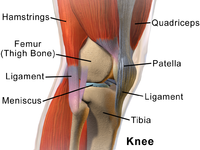
Photo from wikipedia
BackgroundObesity remains the strongest predictor of knee osteoarthritis (OA). Studies have reported improvement in knee pain and function post-bariatric surgery secondary to weight loss and reduced mechanical loading, yet others… Click to show full abstract
BackgroundObesity remains the strongest predictor of knee osteoarthritis (OA). Studies have reported improvement in knee pain and function post-bariatric surgery secondary to weight loss and reduced mechanical loading, yet others found increased rates of total knee arthroplasty (TKA) in that patient population. To address this controversy, our study aimed to further assess the effect of surgically induced, “rapid” weight loss on knee pain and function.MethodsObese patients with chronic knee pain, who were undergoing bariatric surgery, were enrolled and surveyed preoperatively and 3 months postoperatively. Our outcome measures were knee pain and knee function, assessed by a knee injury and osteoarthritis outcome score (KOOS). The paired t test was used to compare pre- and postoperative KOOS scores. Pearson correlation coefficient was used to test the correlation between change in body mass index (BMI) with knee function, pain, and stiffness.ResultsA total of 30 patients was included in the study. The mean age was 35 years, with a mean preoperative BMI of 42.8. The mean difference in BMI at 3 months was 8.4 (SD3). There was a significant improvement in KOOS, − 23.2 (± 20) points, p < 0.01, most pronounced in knee function related to sport activities, with a difference of − 22.6 points, p < 0.01. Knee pain scores improved but did not reach statistical significance.ConclusionSurgically induced rapid weight loss significantly improved knee function, particularly related to sports. However, there was no change in knee pain. This may be related to increased high-impact knee exercises and reduced lean mass. Tailored exercise programs for bariatric surgery patients postoperatively, may improve symptoms and decrease the need for knee replacements in the long term.
Journal Title: Journal of Orthopaedic Surgery and Research
Year Published: 2018
Link to full text (if available)
Share on Social Media: Sign Up to like & get
recommendations!